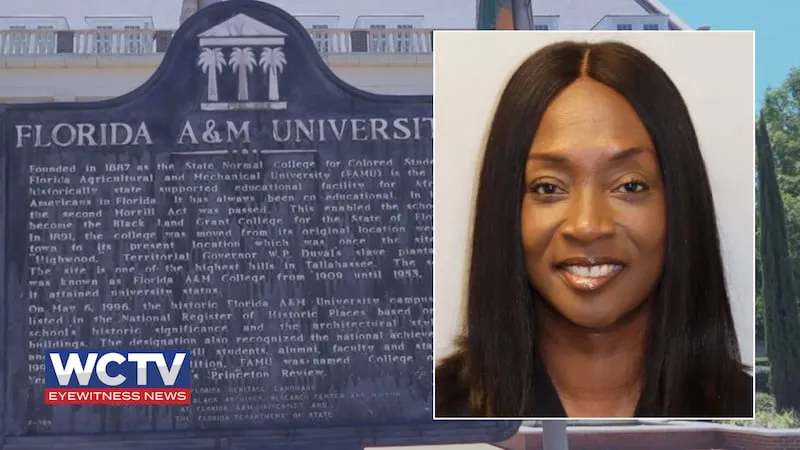Angela Suggs: From Leadership to LegalTrouble
The landscape of collegiate athletics is often marred by scandal, and the recent arrest of Florida A&M University (FAMU) Athletic Director Angela Suggs has thrown a spotlight onto ethical accountability within the sports administration realm. Suggs has been charged with grand theft and fraud, accused of misusing a credit card from her former position for personal gain, specifically to fund several casino trips.
A Brief Overview of the Situation
The Florida Department of Law Enforcement (FDLE) confirmed Suggs’ arrest this week following an investigation that traced a pattern of suspicious financial transactions back to her tenure at a prior institution—Florida A&M University’s athletic department. The criminal allegations state that Suggs, while serving as assistant athletic director at another university, used the credit card for personal expenses, diverting funds primarily toward gaming activities. The sum of the funds misappropriated is yet to be disclosed, but authorities are treating this case with a level of seriousness commensurate with its implications for public trust and institutional integrity.
Impact on FAMU’s Athletic Department
The ramifications of Suggs’ actions extend beyond mere legal charges; they reverberate throughout the fabric of FAMU’s athletic program. As an institution with a storied history of producing successful athletes and programs, this incident raises significant concerns about the oversight and accountability mechanisms in place within the department.
FAMU President Larry Robinson expressed disappointment over the situation, emphasizing the importance of ethical stewardship in university leadership roles. “We hold our leaders to the highest standards of accountability and integrity. The behaviors alleged in this case are unacceptable,” he stated in a press release following the arrest.
Understanding the Charges
Grand theft in the state of Florida encompasses a range of offenses that involve the unlawful taking of property or funds valued above a certain limit, usually $750. When applied in a collegiate context, instances of financial misconduct can lead to serious repercussions for the individual as well as the institutions involved. Additionally, fraud charges typically accompany grand theft allegations when deceptive practices are employed to secure illicit gains.
Suggs’ arrest has raised questions among her peers in the sports management community regarding oversight measures. Experts in collegiate athletics highlight the need for more stringent financial controls and ethical training among administrators to prevent similar situations from occurring in the future.
The Personal Journey of Angela Suggs
Angela Suggs previously enjoyed a reputable career within collegiate athletics. She joined FAMU’s athletic department in 2019 following substantial stints at other universities, including a leadership role at a Southeastern Conference institution. Her hiring was framed as a turning point for the program, with hopes for revitalization and new initiatives aimed at fostering student-athlete success and community engagement.
However, this sudden turn of events has overshadowed her contributions to the field. Those who followed her career were taken aback by the criminal allegations now levied against her. Friends and colleagues expressed shock, noting that they saw Suggs as an upstanding professional dedicated to the advancement of athletics. Conversations within the community recognize the broader implications of such a downfall, particularly in the context of athletes who look up to their leaders.
Reactions from the Community
The arrest of Suggs has prompted an outpouring of reactions from students, faculty, and alumni of FAMU. Many have voiced their disappointment, underlining the need for ethical clarity and responsibility among university administrators. Several student-athletes took to social media expressing pride in the university but disheartened by the incident.
Student government representative Marcus Thompson stated, “As student-athletes, we look up to our athletic directors and administrators. This misconduct is a poor reflection of our values as a university and community. We need leaders who embody integrity and responsibility, not ones facing criminal charges.”
Moving Forward: Institutional Reflections
In the wake of this incident, FAMU will likely undertake a thorough review of its financial policies surrounding the athletic department. The need for enhanced oversight mechanisms could assume greater urgency in ensuring the ethical handling of funds moving forward.
The university may also reconsider its hiring practices, especially regarding financial management competencies among its senior administrative staff. Fortifying these protocols is essential not just to safeguard the institution against similar incidents but also to restore faith among stakeholders who bear the potential impact of such misconduct.
Call for Accountability in Collegiate Athletics
This egregious case underscores a growing concern prevalent in collegiate athletics regarding transparency and ethical behavior. As student-athletes increasingly become symbols of institutional pride and financial investment, the steerage towards responsible behavior among those in decision-making positions remains critical.
Research suggests that financial mismanagement, while not isolated to college athletics, thrives in environments where accountability mechanisms are vague or non-existent. As such, the call for more robust institutional oversight should echo in boardrooms across university athletic departments nationwide.
The Bigger Picture
Angela Suggs’ situation illustrates the need to confront systemic vulnerabilities that exist within collegiate athletics, building a better framework that champions ethics and accountability. From policymakers to the NCAA, stakeholders must work together to develop a sustainable model focused on promoting ethical practices.
The consequences of this scandal will extend beyond Suggs personally, affecting FAMU’s athletic program’s reputation and funding opportunities. Potential sponsors and supporters may hesitate to invest in a program facing such allegations, leading to a broader impact on the university’s athletic initiatives.
Conclusion: Lessons to Learn
As the legal proceedings unfold, Angela Suggs finds herself at a critical juncture that could define not only her career and reputation but also influence the trajectory of FAMU’s athletic programs moving forward. Stakeholders will be watching closely as this case progresses, knowing that the implications reach far beyond the individual involved.
The incident serves as a cautionary tale; all levels of collegiate athletics must prioritize ethical behavior, financial integrity, and responsibility. The road ahead will require introspection, lessons learned, and a commitment to fostering environments where misconduct is neither tolerated nor overlooked.







